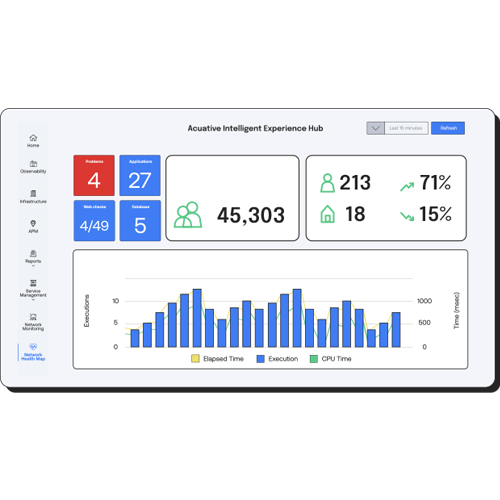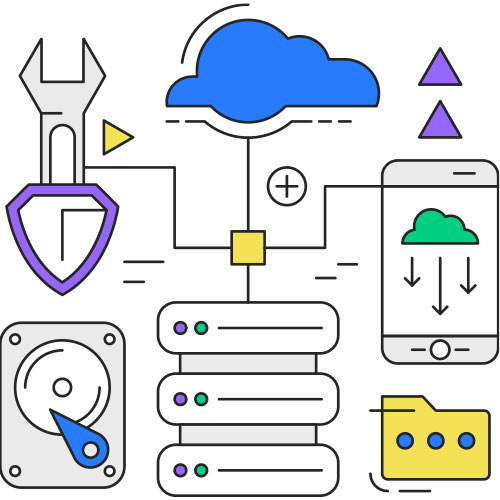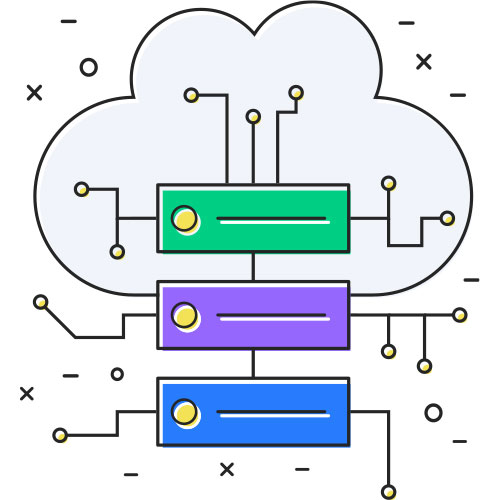Solutions
Powerful Features of Graph Visualization
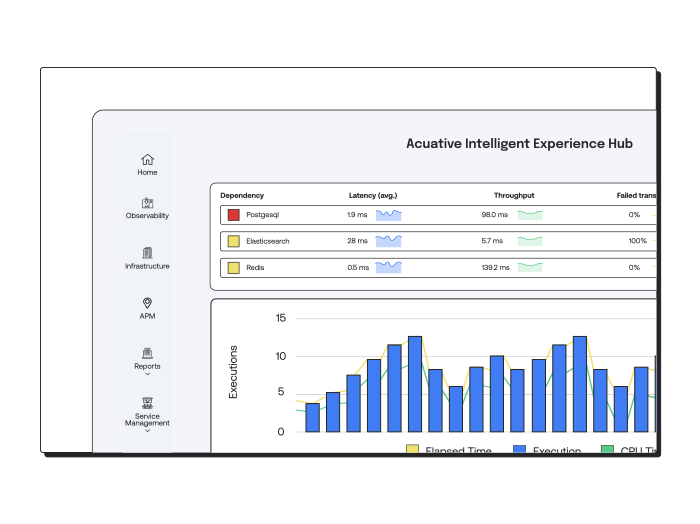
Graph Database Solutions Tailored to Your Data Needs
Acuative offers customized graph database solutions that optimize how your business stores and analyzes interconnected data. Whether you're just starting or have an existing graph database, we help you leverage advanced graph visualization, analytics, and machine learning to accelerate insights and make context-based decisions.
Our seamless integration and continuous support ensure scalable solutions that align with your business goals, empowering you to unlock the full potential of graph technology for faster, more impactful insights.
Our Services
Start Your Graph Journey With Acuative
Partner with experts to implement, optimize, and scale graph database solutions that drive measurable business impact.

Run Anywhere
The graph database can run on-premises and natively across any public cloud environment, including GCP, AWS, and Microsoft Azure, offering unmatched deployment flexibility.

Continuous Release Support
Regular updates keep your graph database at the forefront of innovation and security, ensuring optimal performance across all product offerings.

Centralized Administration
Easily administer and monitor all graph database deployments from one centralized location, simplifying operations and enhancing efficiency with a dedicated Ops Manager.
USE CASES
How Graph Databases Drive Solutions Across Industries
Graph technology powers smarter, faster decisions across sectors by linking and analyzing complex data relationships.
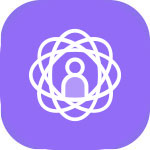
Generative AI
Enhance AI accuracy by connecting and contextualizing large datasets.
![]()
Knowledge Graphs
Organize dispersed information for easier search, analysis, and application.
![]()
Fraud Detection
Detect fraudulent activity in real-time through relationship analysis.

Master Data Management
Maintain consistency and accuracy across systems.
![]()
Network & IT Operations
Optimize performance and quickly troubleshoot issues in IT systems.
![]()
Real-Time Recommendations
Deliver personalized insights and suggestions instantly.

Data Privacy & Compliance
Monitor data flows and maintain regulatory alignment.
![]()
Supply Chain Management
Improve logistics and decision-making with real-time visibility.
Industries
Graph Solutions Tailored to Different Sectors
Adapt graph technology to address the unique challenges and opportunities in your industry.
Financial Services
Detect fraud, manage risk, and uncover insights through real-time relationship analysis.
Government
Secure data, manage identities, and analyze large datasets for informed decision-making.
Healthcare
Track patient histories and optimize care through connected medical data.
Retail
Understand customer behavior and streamline operations to boost sales and engagement.
Queries
Run complex queries effortlessly to explore data relationships and patterns, allowing you to extract meaningful insights directly from the graph in real-time.
Filtering
Apply advanced filters to isolate specific nodes, relationships, or attributes within your graph, refining your view for more targeted analysis and understanding.
Timeline
Visualize data changes over time with a timeline feature, enabling you to track the evolution of relationships and events across your dataset.
Grouping
Automatically group related nodes or entities, simplifying large graphs into manageable clusters that enhance clarity and reveal significant data patterns.
Geo-layout
Integrate geographical data with your graph, plotting nodes and relationships on a map for a spatial representation of your connections.
Custom Actions
Tailor graph interactions with custom actions, empowering users to define specific workflows or trigger
Frequently Asked Questions (FAQ)
What is a graph database, and how is it different from traditional databases?
A graph database stores data as nodes (entities) and edges (relationships) rather than tables or documents. This structure makes it easier to analyze complex relationships, uncover patterns, and adapt as your business data grows.
Which businesses can benefit from a graph database?
Any business that works with interconnected data can benefit. Common sectors include financial services, healthcare, retail, telecommunications, government, and logistics. Graph databases are especially valuable for fraud detection, recommendation systems, network analysis, and master data management.
How does graph visualization help my business?
Graph visualization allows you to see your data as a network, making relationships, patterns, and trends more intuitive. Features like filtering, grouping, and timelines help you quickly interpret complex datasets and make informed decisions.
Can a graph database integrate with existing systems?
Yes. Modern graph databases are designed to integrate seamlessly with your current infrastructure, analytics tools, and AI applications. Acuative ensures smooth implementation and continuous support for scalable solutions.
How does a graph database improve AI applications?
By providing rich, connected data, graph databases give AI models deeper context. This leads to more accurate predictions, advanced insights, and better real-time decision-making across applications like recommendation engines, generative AI, and fraud detection.
Is graph database technology secure?
Absolutely. Graph databases can help enforce access controls, monitor data flows, and support regulatory compliance, keeping your data safe while providing actionable insights.
How quickly can I see results after implementing a graph database?
Results vary depending on your data and use case, but many businesses see immediate improvements in data analysis, visualization, and operational insights. Acuative works to ensure rapid deployment and measurable impact.
Do I need technical expertise to use a graph database?
While some technical knowledge helps, graph visualization tools and custom actions simplify interaction with your data. Acuative provides training, support, and tailored solutions to ensure your team can leverage the database effectively.
Can graph databases handle large volumes of data?
Yes. Graph databases are designed for scalability, allowing you to manage increasingly complex datasets without sacrificing performance.
How do I get started with a graph database at my company?
Schedule a consultation with Acuative’s experts. We assess your data needs, design a tailored solution, and guide you through implementation, optimization, and ongoing support.





